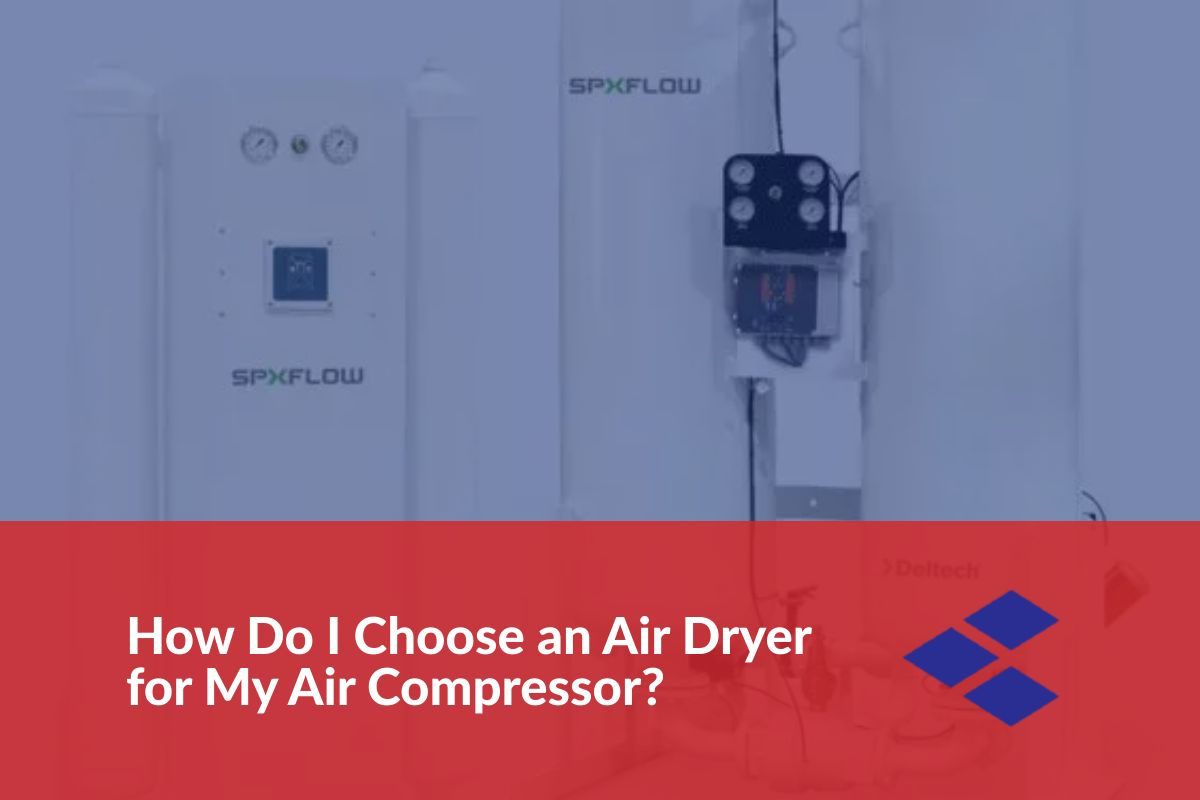
Air dryers perform a valuable and necessary function within a variety of different industrial applications. Getting the right air dryer for your application is an important part of having a streamlined and successful production business. But how do you know which air dryer is the right one for the air compressor you have?
What is an Air Dryer?
Air dryers are almost always recommended in settings where industrial air compressor equipment is utilized. When the air in a system is compressed, the relative humidity of the system can increase vastly. This excess amount of moisture can cause issues within the system, so the use of an air dryer is necessary. By removing the moisture from the air within the compressor, air dryers lower the dew point within the system. Without the air dryer, the air in the compressor may reach the dew point temperature. After reaching this temperature, water vapor can condense, causing serious issues within the system, including corrosion, frozen pipes, and contamination.
The Importance of Air Dryers
Air dryers are important for a number of different reasons.
- Stops water buildup: When water builds up within a system, it can cause equipment to perform inaccurately or at a reduced pace. Stopping that buildup is important in order to ensure a streamlined system.
- Eliminates contamination: For industries like food production, pharmaceutical manufacturing, painting, laser cutting, and welding all require compressed air with a high level of purity. Water buildups can cause products to become damaged, which can be a big problem.
- Halts freezing: Frozen water within a system can lead to issues with the moving components within that system, which has an adverse effect on production levels.
- Limits microbial growth: This aspect of air dryers is particularly vital for pharmaceutical and food and beverage applications, where compressed air is often utilized to mix and convey products.
- Reduces corrosion: Water has the potential to corrode a variety of different materials, including steel. Corrosion can cause damage to various pipes, drums, tanks, and vessels within a production system.
- Improves efficiency: Many systems use tools and pieces of equipment that are powered by compressed air. If water is present within that compressed air, it can damage components within the equipment and reduce their power, lowering the rate and quality of production.
Types of Air Dryers
- Integrated Dryers: This type of air dryer is ideal for applications that take place in congested or small workspaces. Integrated air dryers can also reduce the overall cost of your system, and you’ll also save as integrated dryers don’t require installation. For many applications, integrated air dryer systems are simply a more convenient option.
- Cycling Refrigerated Dryers: Cycling refrigerated air dryers are typically preferred in comparison to non-cycling dryers, as they use less electricity. They work when required, starting when they are turned on and shutting themselves off automatically when not required.
- Non-Cycling Refrigerated Dryers: Non-cycling refrigerated dryers utilize refrigeration compressors to cool the air within the system to reduce moisture. These dryers are usually less expensive. They will run continuously, starting as soon as they are turned on and only stopping when they are shut down manually.
- Desiccant Dryers: If you require an air dryer that will reach dew points at -20 degrees or lower, you may wish to utilize a desiccant air dryer. These dryers are popular in more sensitive applications, where even a small amount of moisture can be a problem.
- Membrane Dryers: These types of air dryers remove moisture particles from compressed air through the use of a multi-step filtration system. After filtration, osmosis is utilized to remove any remaining water vapor from the air.
6 Things to Keep in Mind
Here are a few things that you may want to keep in mind when choosing an air dryer. Knowing the answers to these questions will make your decision a lot easier.
- How much space do you have for an air dryer? This will give you a good idea as to whether you need an integrated air dryer or you can opt for an unintegrated system.
- What is your air compressor capacity and your ambient air factor?
- What type of operating environment are you working with?
- What is the dew point stability within your system? This will inform you of the temperature the compressed air in your system can reach before it condenses and turn into water vapor.
- How much energy can you afford to use? You have to take into consideration the amount of energy the air dryer system will utilize and compare that to what you can afford in energy use within your system.
- What is the maximum airflow (in standard cubic feet per minute) that your system requires?
Finding the Right Air Dryer for Your Air Compressor in the Carolinas
Finding the right air dryer for your air compressor is important, but knowing which dryer is right can be complicated. While you may be able to get an idea of the right kind of air dryer for you, contacting a professional is always a great way to ensure you get the right air dryer for your application.
If you are in North or South Carolina, ESA is here to help ensure that you always get the right equipment for your application and requirements. Let one of our expert representatives answer your questions and help you find the best air dryer for your air compressor.
Arthur Pue
Arthur Pue is the President of Engineering Sales Associates. Connect with him on LinkedIn.
